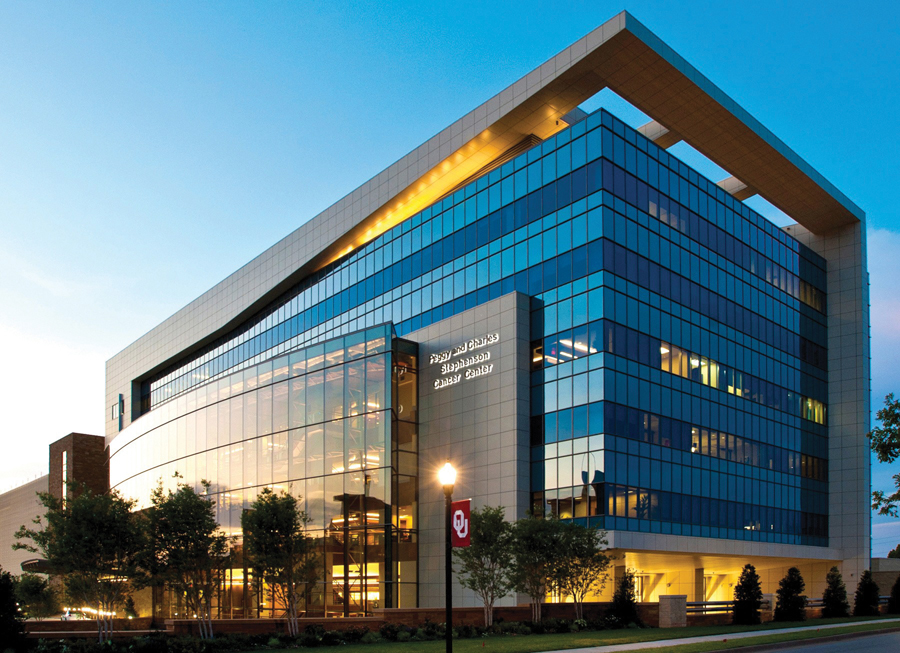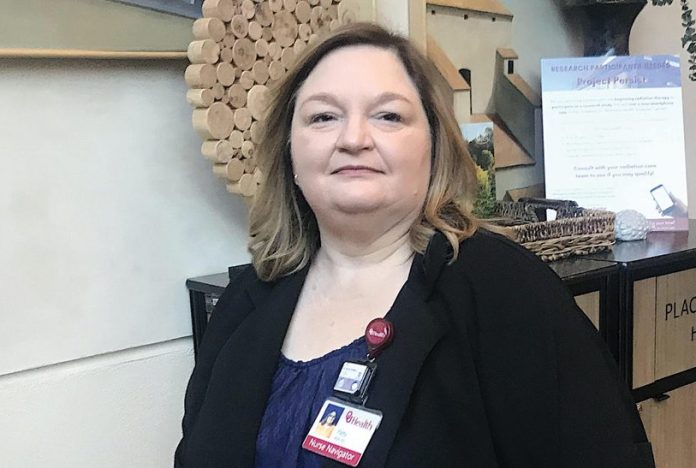by James Coburn, Staff Writer

When Patricia Powell’s mother died of metastatic breast cancer, she turned her experience into a way to give back to the cancer community.
“So many people touched my family in my mother’s journey, and this is my way of giving back to others,” said Powell, RN, a radiation department nurse navigator at OU Health Stephenson Cancer Center, located in Oklahoma City.
There may be a lot of confusion for families and their loved one when first diagnosed with cancer. Nurse navigators are there to help ease their journey.
“I have certainly learned from the other navigators in this facility in trying to build this role. I’ve certainly reached out to them, and they are a fantastic group that all work so well together,” she said. (STORY CONTINUES BELOW)
Navigators are behind the scenes a lot. They coordinate the patients’ timeline of care, keep the patient up to date with what’s happened. They make sure treatments are running on course and imaging is ordered.
“Making sure things don’t fall through the cracks, I think is a big part of navigation,” she said.
Powell is currently working toward her Master of Science in Nursing Administration and Leadership degree at the University of Oklahoma. She earned her Bachelor of Science in Nursing degree at West Texas A&M University.
She has served 10 of her 30-year nursing career at Stephenson Cancer Center. She moved to Oklahoma City from Texas, and it has been a long lasting career move.
“I can’t imagine leaving the Stephenson Cancer Center at OU Health,” Powell said.
Her career includes hospice and postpartum nurse.
“This is my third stint in oncology nursing. I’ve always come back to it because I have a passion for it,” Powell said. “It was my first real job out of school. There is something about oncology patients that just teaches you so much about resilience and so much about life.”
She worked in radiation oncology before accepting the role of nurse navigator about a year ago. As nurse navigator she has advocated for patients. At times she has pushed to get people treatment a Stephenson Cancer Center when they couldn’t get their treatment elsewhere, she said.
“There’s so many things that people often don’t realize goes into a person’s journey that’s not just their diagnosis,” she continued.
Cancer impacts a person’s life and finances. She found that many issues cause disparities in getting people the care they need. She has helped others find solutions for lodging and obtaining insurance to allow them to come to Stephenson Cancer Center.
“I’ve been able to do that for someone — a young girl that lived in Texas who couldn’t get treatment where she was at,” Powell said. “I’ve been able to do that for someone who couldn’t get treatment in a smaller town around here because they just couldn’t provide the treatment that was needed.”
It’s important to understand that cancer is not necessarily a death sentence. She has seen tremendous advancements in care since serving in a bone marrow transplant unit many years ago. Conditions brought a shorter life expectancy than today’s technology provides.
Nursing has enriched her life by getting to know patients, seeing them frequently and seeing their positive outcomes. The nurses have relied on each other to get through the difficult times, especially through COVID, she said.
“When you see the negative outcomes, it bonds you with your coworkers. You really get a camaraderie. They become almost like family to you,” Powell explained.
The group of nurses she works with do a lot of things outside of work together. They help each other through personal struggles. There is something special about working at Stephenson Cancer Center, she said.
“Research is a big part of what we do,” Powell said. The center has been a national leader in the number of people involved in research.
“Our physicians, our nurses, our research team — everybody is so dedicated to helping patients understand the research study, getting them the choice about it, answering questions and helping them through that study,” she said.
Powell thinks about how much research has evolved since her mother’s experience with breast cancer.
“We wouldn’t have that without the research,” she said. “It’s a privilege to be part of a system that focuses on that, for the people of Oklahoma and nationally.”
Powell has learned a lot about life from being a nurse, she said. She has engaged with people of different cultural backgrounds.
“It has given me a whole new perspective on things, and certainly working with the cancer patients and enjoying their humor and resilience and everything that they do for this journey is such an honor,” she said.













